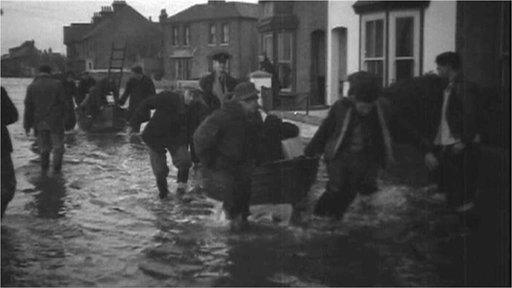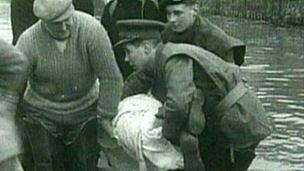Heroism and tragedy in Norfolk, Suffolk and Essex flood
- Published

People being rescued from their homes in boats after the sea swept into coastal towns and villages
Survivors of the 1953 floods described the "horrendous" night when homes were swept away and people had to flee to safety.
Some expressed their fears that a similar disaster could hit Norfolk, Suffolk and Essex again.
The three counties bore the worst of the floods caused by the combination of a deep weather depression, high tides and a hurricane-force northerly wind.
Weather experts said it was a once in 300-year event.
Sea defences were breached and experts said within minutes 2,000 million gallons of water swept inland taking everyone by surprise.
David Fisher, a farmer at Southminster in Essex, served as a county councillor and was involved in planning flood defences for the east coast.
His work was influenced by the night of 31 January 1953 when he received a phone call in the early hours.
"I was told the water was coming up towards the farm so I had to get a boat to rescue the people at the end of a track road near the sea wall.
"As I was rowing back to the farm I looked back and saw troops walking along the sea wall."
This was the beginning of an all-services military operation.
William Stevens from the Jaywick Historical Society said the water reached more than half a mile inland at the holiday resort.
'Expanse of water'
"The sea wall had been breached in 22 places around Jaywick . It was fortunate that the accommodation, caravans and chalets were empty as the death toll would have been much higher."
At Dovercourt Graham Richmond was woken by his father who was worried about his mother in Bathside, Harwich.
They got on top of the raised railway line to survey the Harwich side and it was an expanse of water.
"I still remember the sound of the animals; pigs squealing, horses neighing, dogs barking and cats meowing.
"We realised that we couldn't get to my grandma's house that way so we cycled to the next crossing and found the same situation there, so we rode on into Harwich."
Eventually they got to the grandmother's house and had to move her next door because the water was making it shake.
Later in the night he had to go back and get her medication and felt the floor moving under his feet.

Servicemen were called out to help in the rescue operations
He paid tribute to the navy cadets from HMS Ganges at Shotley who were called in to help.
"I saw many of them up to their necks in water towing boats full of rescued people taking them to safety on higher ground."
In Suffolk five people died in Southwold and they were remembered on Thursday by the vicar of St Edmund's Church the Revd Simon Pitcher.
He also paid tribute to the many people who worked to save others in 1953.
Body in dyke
Susan Doy said she was at a charity dance at the drill hall raising money for the sea cadets.
Late in the evening someone came in to the dance to say that floodwaters were coming.
"We all went down to the pier which had a huge hole in the middle. The amusement arcade was all smashed and the machines and debris floating everywhere.
"We went back to the drill hall and were told that no-one would get home that night."
Southwold mayor Michael Ladd said he had been told of a family from the air base at Bentwaters sitting down for a meal when their home was lifted and floated a quarter of a mile on to the marshes.
They were rescued after clinging on to the top of their roof.
Norfolk was very badly hit and Walcott's current flood warden Matt Alan is concerned it might happen again.
He said warning sirens, which everyone was able to hear, had now been replaced by text and email messages.
"Not everyone has access to these so five years ago when Walcott was hit by floods wardens had to go round to individual homes with warnings."
Many people in north-west Norfolk were living in caravans, chalets and old railway carriages on low-lying ground.
David Bocking and Noel Linge were called out with other young men to help as the sea walls and defences were breached.
But even these hardy people were not safe as the sea swept into Heacham and Snettisham.
Working together
Mr Linge said: "A man with my father was swept away and we found his body clinging to a post in a dyke a few days later.
"If he'd been able to climb out it was only 100 yards (85m) to higher ground and safety.
Mr Bocking said: "It was unbelievable in the high wind, dark and wet. We had to leave our bikes because we kept being blown off them and almost swept away.
"A rope had been put out and I was able to grab it and it saved my life.
"A young girl was given to me and I waded through the water to take her to my mother's house on higher ground.
"I went back and met a policeman and we found a collapsed bungalow with a woman and her daughter on top of the debris. We walked them back to safety.
"There were a lot of people stranded and split up. It was dark with the wind and sea roaring so it was difficult to see and hear people speak but we worked together and did the best we could.
"It was horrendous and chaotic night."